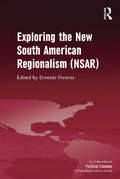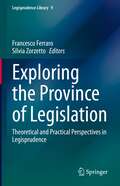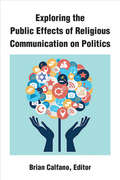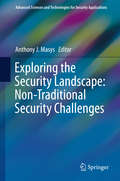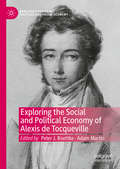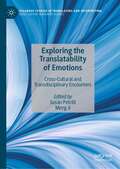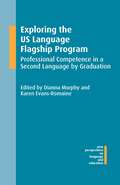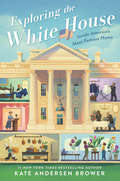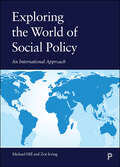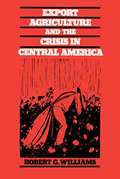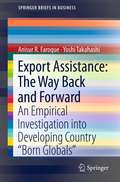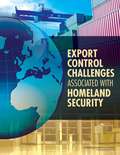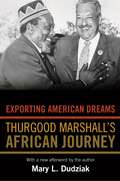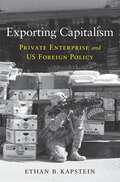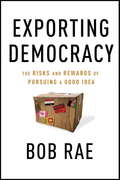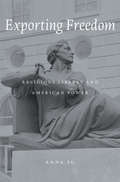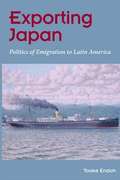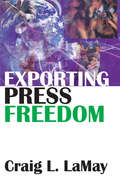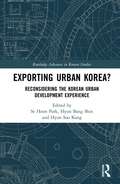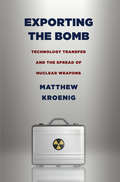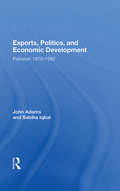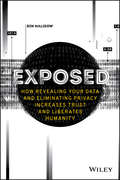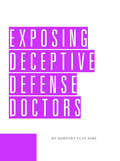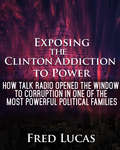- Table View
- List View
Exploring the New South American Regionalism (The International Political Economy of New Regionalisms Series)
by Ernesto VivaresThe events and processes that have taken place in the last decade in South America have given way to one of the most interesting regional phenomena under a global crisis and within a changing world order. From the traditional status of Washington´s backyard and reign of economic and political stability, South America has increasingly turned into a region marked by a heterodox development in the light of other dominant regional tendencies of development-the European Union, NAFTA and the Asia Pacific. The political economic nature of the new South American regionalism (NSAR) is far from echoing the dominant interpretations about it, which reflects the major regional projects today. Given the reach and scope of the existing literature on the topic of the NSAR, there is an important gap concerning its academic exploration in relation to its nature of development, political economic complexity, challenges and orientations. In this sense, this book explores, from a wider and pluralist political economic perspective, the developmental dimensions of the NSAR within a changing hemispheric and world order in transformation. It analyses a set of specific debates: regionalism in the Americas then and now; social and economic development and regional integration; and organized crime, intelligence and defence. An in depth and critical reflection on the complex and heterogeneous path of regionalization taking place in South America from different perspectives and in key issues of regional development.
Exploring the Province of Legislation: Theoretical and Practical Perspectives in Legisprudence (Legisprudence Library #9)
by Francesco Ferraro Silvia ZorzettoLegisprudence considers a variety of perspectives and relies on contributions from numerous different disciplines. Rather than providing examples of the various possible approaches to legisprudential studies, this book – bringing together lawyers and legal theorists from seven different countries – highlights two aspects of the many disciplines involved. Firstly, it discusses theoretical abstraction, which borders on, or enters into the realm of full-fledged philosophical speculation. Secondly, it examines empirical observation of specific cases, precisely situated regarding their spatial or historical collocation, or referring to a particular species of legislative policy. Focusing on legislation both as a process and as a result, the aim of the book is twofold: on the one hand, it demonstrates that, far from being a purely theoretical and exclusively academic intellectual enterprise, legisprudence can offer criteria for both assessing and improving the quality of real-world legislation. On the other hand, it shows how lawmaking is at least as interesting and legitimate a field of inquiry as adjudication and interpretation of laws for legal theorists and philosophers of law, and that they are already equipped with extremely valuable intellectual tools for fruitful legisprudential inquiry. The book is organized in two parts. The first part comprises legal-theoretical accounts on general aspects of legislation as a process and as a result. The second part presents contributions focusing on specific experiences of evaluations of legislative quality and contributions to the legislature’s work on the part of the public, as well as on particular legislative policies, methodologies in lawmaking, and problems regarding legislation as an instrument.
Exploring the Public Effects of Religious Communication on Politics
by Brian CalfanoThough not all people are religious believers, religion has played important historic roles in developing political systems, parties, and policies—affecting believers and nonbelievers alike. This is particularly true in the United States, where scholars have devoted considerable attention to a variety of political phenomena at the intersection of religious belief and identity, including social movements, voting behavior, public opinion, and public policy. These outcomes are motivated by “identity boundary-making” among the religiously affiliated. The contributors to this volume examine two main factors that influence religious identity: the communication of religious ideas and the perceptions of people (including elites) in communicating said ideas. Exploring the Public Effects of Religious Communication on Politics examines an array of religious communication phenomena. These include the media’s role in furthering religious narratives about minority groups, religious strategies that interest groups use to advance their appeal, the variable strength of Islamophobia in cross-national contexts, what qualifies as an “evangelical” identity, and clergy representation of religious and institutional teachings. The volume also provides ways for readers to think about developing new insights into the influence religious communication has on political outcomes.
Exploring the Security Landscape: Non-Traditional Security Challenges
by Anthony J. MasysThis bookprovides international perspective for those studying or working in thesecurity domain, from enforcement to policy. It focuses on non-traditionalthreats in a landscape that has been described as transnational in nature andincorporates natural disasters, gang violence, extremism and terrorism, amongstother issues. Chapters provide innovative thinking on themes includingcyber security, maritime security, transnational crime, human security,globalization and economic security. Relevanttheoretical frameworks are presented and readers are expertly guided throughcomplex threats, from matters pertaining to health security which pose threats notonly to humans but also have significant national security implications, toissues regarding critical infrastructure vulnerability and the complexity ofunderstanding terrorist operations. Authors reveal how emerging uncertaintiesregarding global critical infrastructure and supply chain security, foodsecurity, and health security are linked to the notion of human security. Securityprofessionals, policy makers and academics will all gain from the insights,strategies and perspectives in this book. It builds understanding of thedeepening and broadening domain of security studies and provides a valuablereference text for courses on security studies and international relations.
Exploring the Social and Political Economy of Alexis de Tocqueville (Mercatus Studies in Political and Social Economy)
by Adam Martin Peter J. BoettkeAlexis de Tocqueville’s work touched upon an exceptionally broad range of social scientific disciplines, from economics to religion, and from education to international affairs. His work consistently appeals to scholars dismayed by existing disciplinary silos. Tocqueville is also well-regarded for diagnosing both the promise and perils of democratic life. Consideration of his ideas provokes serious consideration of and engagement with contemporary trends as citizens in democratic countries cope with challenges posed by new technological, cultural, and political changes. However, attention to Tocqueville is uneven across disciplines, with political theorists paying him the most heed and economists the least. This volume focuses on political economy, trying to bridge this divide. This book collects essays by emerging scholars from a variety of disciplines—political science, economics, sociology, philosophy, and social thought—to examine Tocqueville’s thoughts on political and social economy and its contemporary relevance. The book is divided into two halves. The first half engages with the main currents of research on Tocqueville’s own thoughts regarding economic institutions, constitutionalism, liberalism, history, and education. The second half applies Tocqueville’s insights to diverse contemporary topics including international relations, citizenship, mass incarceration, and pedagogy. This volume will be of interest to scholars and students interested in Tocqueville, the history of political thought, and a variety of current policy issues.
Exploring the Translatability of Emotions: Cross-Cultural and Transdisciplinary Encounters (Palgrave Studies in Translating and Interpreting)
by Susan Petrilli Meng JiThis book offers an in-depth, cross-cultural and transdisciplinary discussion of the translatability of social emotions. The contributors are leading philosophers, semioticians, anthropologists, communication and translation theorists from Europe, America and Australia. Part I explores the translatability of emotions as a culturally embedded social behaviour that requires a contextualized interpretation of their origins and development in different social and cultural settings. These studies make useful preparations for the studies introduced in Part II that continue investigating the cultural and sociological influence of the development of social emotions with a special focus on the dialogical relation to the body and to others. Part III presses on delving into specific types of emotions which underscore social interactions at both the community and individual levels, such as dignity, (im-)politeness, self-regard and self-esteem. Finally, Part IV offers a further development on the preceding parts as it discusses problems of translation, expressibility and mass-medial communication of emotions. This book will engage translation scholars as well as those with a broader interest in the study and interpretation of emotions from different fields, perspectives and disciplines.
Exploring the US Language Flagship Program: Professional Competence in a Second Language by Graduation
by Karen Evans-Romaine Dianna MurphyA number of reports in the US have highlighted the country's need for improved second language skills for both national security and economic competitiveness. The Language Flagship program, launched in 2002, aims to raise expectations regarding language proficiency levels at the post-secondary level and to address structural gaps in the curricula of many L2 programs. This federally funded program provides opportunities for US undergraduate students in any specialization to reach a professional level of competence in a targeted second language by graduation. This volume highlights innovative practices that enable students to achieve this goal - even those with no exposure to the second language prior to university. This book explores the rationale and history of the federal program and showcases models and strategies of existing Flagship programs.
Exploring the White House: Inside America's Most Famous Home
by Kate Andersen Brower#1 New York Times bestselling author Kate Andersen Brower shares a special inside look into the most famous home in America—and the lives of hardworking staff members and first ladies who’ve maintained it. Have you ever wondered what exactly goes on inside 1600 Pennsylvania Avenue? Sure, the president of the United States works and resides there, but do you know who helps keep this historic house running?It’s no simple task, especially when there are important state events and foreign dignitaries—in addition to presidential pups, mischievous children, and even a couple of ghosts. And its Residence workers and first ladies make sure everything is in check and running smoothly. Featuring fascinating photos, fun facts, and memorable quotes from the residents and first ladies of the White House, Exploring the White House: Inside America's Most Famous Home is the perfect read for any curious kid!
Exploring the World of Social Policy: An International Approach
by Michael Hill Zoë IrvingThis bold new textbook represents a significant step forward in social policy teaching by combining comparative and global perspectives. Introducing readers to a wide spread of international challenges and issues, the book shows how insights into policy can be generated using a comparative and multidisciplinary approach. Global in its canvas and analytical in its method, the book: • explores the economic, social and political contexts of social policy; • examines in detail its institutions and fields of practice; • illustrates the field’s main ideas, themes and practices, drawing on a rich international literature and using pertinent and thought-provoking examples. Authored by two highly respected and experienced academics, this book demonstrates the rewards of studying social policy from an international perspective by avoiding the constraints of a single-nation focus. Clear, authoritative and wide-ranging, it will be essential reading for students of social sciences taking courses covering social policy, social welfare and comparative policy analysis.
Export Agriculture and the Crisis in Central America
by Robert G. WilliamsBefore social unrest shook the region in the 1970s, Central America experienced more than a decade of rapid export growth by adding cotton and beef to the traditional coffee and bananas. Williams shows how the rapid growth contributed to the present social and political crisis, examines the causes of the export boom and who benefited from it, and shows the impact of the boom on land use, the ecology, and the conditions of life in the rural areas.
Export Assistance: The Way Back and Forward
by Yoshi Takahashi Anisur R. Faroque"Born global" (BG) firms have attracted many researchers throughout the last decade. The emergence of this phenomenon initially posed a serious challenge to the validity and applicability of the traditional "stage" theory of internationalization; however, scholars have more recently been able to reconcile traditional and new theories into a single framework for studying the process of internationalization. This volume applies both network theory and knowledge-based theory to analyze export assistance in the context of internationalization of low-tech BG firms in developing countries (with an in-depth study of the apparel industry in Bangladesh). The findings that non-governmental network partners provide more useful advice than government agencies is one that may resonate through other countries, including developed economies. Government's more useful role is confined to the financial support and incentives that are provided to such firms. It is, however, the commitment to exporting that emerges as critical for performance, more so than export strategy, suggesting that enhanced export performance is to attract, reassure and motivate entrepreneurs in ways that strengthen their commitment to international expansion.
Export Control Challenges Associated with Homeland Security
by National Research Council Policy and Global Affairs Committee on Homeland Security and Export Controls Development, Security, and CooperationThe "homeland" security mission of the Department of Homeland Security (DHS) is paradoxical: Its mission space is uniquely focused on the domestic consequences of security threats, but these threats may be international in origin, organization, and implementation. The DHS is responsible for the domestic security implications of threats to the United States posed, in part, through the global networks of which the United States is a part. While the security of the U.S. air transportation network could be increased if it were isolated from connections to the larger international network, doing so would be a highly destructive step for the entire fabric of global commerce and the free movement of people. Instead, the U.S. government, led by DHS, is taking a leadership role in the process of protecting the global networks in which the United States participates. These numerous networks are both real (e.g., civil air transport, international ocean shipping, postal services, international air freight) and virtual (the Internet, international financial payments system), and they have become vital elements of the U.S. economy and civil society. Export Control Challenges Associated with Securing the Homeland found that outdated regulations are not uniquely responsible for the problems that export controls post to DHS, although they are certainly an integral part of the picture. This report also explains that the source of these problems lies within a policy process that has yet to take into account the unique mission of DHS relative to export controls. Export Control Challenges Associated with Securing the Homeland explains the need by the Department of Defense and State to recognize the international nature of DHS's vital statutory mission, the need to further develop internal processes at DHS to meet export control requirements and implement export control policies, as well as the need to reform the export control interagency process in ways that enable DHS to work through the U.S. export control process to cooperate with its foreign counterparts.
Exporting American Dreams: Thurgood Marshall's African Journey
by Mary L. DudziakMary Dudziak's Exporting American Dreams tells the little-known story of Thurgood Marshall's work with Kenyan leaders as they fought with the British for independence in the early 1960s. Not long after he led the legal team in Brown v. Board of Education, Marshall aided Kenya's constitutional negotiations, as adversaries battled over rights and land--not with weapons, but with legal arguments. Set in the context of Marshall's civil rights work in the United States, this transnational history sheds light on legal reform and social change in the midst of violent upheavals in Africa and America. While the struggle for rights on both continents played out on a global stage, it was a deeply personal journey for Marshall. Even as his belief in the equalizing power of law was challenged during his career as a Supreme Court justice, and in Kenya the new government sacrificed the rights he cherished, Kenya's founding moment remained for him a time and place when all things had seemed possible.
Exporting Capitalism: Private Enterprise and US Foreign Policy
by Ethan B. KapsteinThe first comprehensive history of America’s attempts to promote international development by exporting private enterprise, a story marked by frequent failure and occasional success. Foreign aid is a primary tool of US foreign policy, but direct financial support and ventures like the Peace Corps constitute just a sliver of the American global development pie. Since the 1940s, the United States has relied on the private sector to carry out its ambitions in the developing world. This is the first full account of what has worked and, more often, what has failed in efforts to export American-style capitalism. Ethan Kapstein draws on archival sources and his wide-ranging experience in international development to provide penetrating case studies from Latin America and East Asia to the former Soviet Union, Afghanistan, and Iraq. After WWII the Truman and Eisenhower administrations urged US companies to expand across the developing world. But corporations preferred advanced countries, and many developing nations, including Taiwan and South Korea, were cool to foreign investment. The Cold War made exporting capitalism more important than ever, even if that meant overthrowing foreign governments. The fall of the Soviet Union brought new opportunities as the United States promoted privatization and the bankrolling of local oligarchs. Following the invasions of Afghanistan and Iraq, the United States had blank slates for building these economies, but ongoing conflict eroded such hopes. Kapstein’s sobering history shows that private enterprise is no substitute for foreign aid. Investors are often unwilling to put capital at risk in unstable countries. Only in settings with stable governments and diverse economic elites can private enterprise take root. These lessons are crucial as the United States challenges China for global influence.
Exporting Democracy
by Bob RaeThe way most Western politicians talk, democracy is the pinnacle of civilization, the best political system there is. Many think it's the system the rest of the world ought to adopt. Bob Rae is not one of them. He is too well informed about the difficulties and dangers of implanting democracy in foreign lands. Exporting Democracy is an eloquently argued book in which Rae brings his lively, nuanced understanding to bear on the history and current fortunes of this powerful idea. He shows how it and the related ideas of freedom, human rights, and federalism have been pushed to centre stage by the collapse of Soviet communism and by ongoing wars to topple secular and religious dictatorships in the Middle East. He's also witnessed attempts to implant democracy in three countries riven by tribal and ethnic divisions, Iraq, Afghanistan, and Sri Lanka, and offers readers a cool appraisal of the effort.From the Hardcover edition.
Exporting Freedom: Religious Liberty and American Power
by Anna SuReligious freedom is recognized as a basic human right, guaranteed by nearly all national constitutions. Anna Su charts the rise of religious freedom as an ideal firmly enshrined in international law and shows how America's promotion of the cause of individuals worldwide to freely practice their faith advanced its ascent as a global power.
Exporting Japan: Politics of Emigration to Latin America
by Toake EndohExporting Japan examines the domestic origins of the Japanese government's policies to promote the emigration of approximately three hundred thousand native Japanese citizens to Latin America between the 1890s and the 1960s. This imperialist policy, spanning two world wars and encompassing both the pre-World War II authoritarian government and the postwar conservative regime, reveals strategic efforts by the Japanese state to control its populace while building an expansive nation beyond its territorial borders. Toake Endoh compellingly argues that Japan's emigration policy embodied the state's anxieties over domestic political stability and its intention to remove marginalized and radicalized social groups by relocating them abroad. Documenting the disproportionate focus of the southwest region of Japan as a source of emigrants, Endoh considers the state's motivations in formulating emigration policies that selected certain elements of the Japanese population for "export." She also recounts the situations migrants encountered once they reached Latin America, where they were often met with distrust and violence in the "yellow scare" of the pre-World War II period.
Exporting Press Freedom
by Craig LaMayInternational media assistance is a small but important form of international democracy-promotion aid. Media assistance boomed after the 1989 transitions in Central Europe, but now flows to virtually all regions of the world. Today the media assistance industry is focused on the problem of sustainability: How are free and independent public affairs media supposed to maintain their editorial mission while facing hostile political systems or the demands of the consumer marketplace? Many media in developing countries have been or are grant-dependent. When grants are exhausted or withdrawn, media that were funded to further democratic consolidation typically wither and die. Some become mere grant chasers. Others abandon public service to the demands of market competition, or political patronage. As a result, governmental and non-governmental grant makers now emphasize the need for sustainability in considering grants in the media sector. Many grant recipients have grown frustrated, sometimes bitter, and have sought to take a much more active role in the way assistance programs are put together. Just how is sustainability to be achieved while also ensuring a public-service editorial mission? Exporting Press Freedom examines the history and practice of media assistance, and argues that the dilemma of media independence and sustainability is best understood as an economic problem rather than one of poor editorial standards or lack of will. It includes profiles of news and public affairs media in developing and democratizing countries, and also of two non-governmental organizations that have pioneered the use of low-interest loans in media assistance. These profiles exemplify strategic and entrepreneurial approaches to developing and supporting public service media. Such approaches may be of use not only in the developing world, but in the consolidated Western democracies as well, where concern has grown about poor journalistic performance and its consequences f
Exporting Urban Korea?: Reconsidering the Korean Urban Development Experience (Routledge Advances in Korean Studies)
by Se Hoon ParkA detailed examination of the “Korean development model” from its urban dimension, evaluating its sociopolitical contexts and implications for international development cooperation. There is an increasing tendency to use the development experience of Asian countries as a reference point for other countries in the Global South. Korea’s condensed urbanization and industrialization, accompanied by the expansion of new cities and industrial complexes across the country, have become one such model, even if the fruits of such development may not have been equitably shared across geographies and generations. The chapters in this book critically reassess the Korean urban development experience from regional policy to new town development, demonstrating how these policy experiences were deeply rooted in Korea’s socioeconomic environment and discussing what can be learned from them when applying them in other developmental contexts. This book will be of great interest to scholars and researchers in the field of urban studies and developmental studies in general, and in Korea’s (urban) development experience in particular.
Exporting the Bomb: Technology Transfer and the Spread of Nuclear Weapons
by Matthew KroenigIn a vitally important book for anyone interested in nuclear proliferation, defense strategy, or international security, Matthew Kroenig points out that nearly every country with a nuclear weapons arsenal received substantial help at some point from a more advanced nuclear state. Why do some countries help others to develop nuclear weapons? Many analysts assume that nuclear transfers are driven by economic considerations. States in dire economic need, they suggest, export sensitive nuclear materials and technology-and ignore the security risk-in a desperate search for hard currency.Kroenig challenges this conventional wisdom. He finds that state decisions to provide sensitive nuclear assistance are the result of a coherent, strategic logic. The spread of nuclear weapons threatens powerful states more than it threatens weak states, and these differential effects of nuclear proliferation encourage countries to provide sensitive nuclear assistance under certain strategic conditions. Countries are more likely to export sensitive nuclear materials and technology when it would have the effect of constraining an enemy and less likely to do so when it would threaten themselves.In Exporting the Bomb, Kroenig examines the most important historical cases, including France's nuclear assistance to Israel in the 1950s and 1960s; the Soviet Union's sensitive transfers to China from 1958 to 1960; China's nuclear aid to Pakistan in the 1980s; and Pakistan's recent technology transfers, with the help of "rogue" scientist A. Q. Khan, from 1987 to 2002. Understanding why states provide sensitive nuclear assistance not only adds to our knowledge of international politics but also aids in international efforts to control the spread of nuclear weapons.
Exports, Politics, And Economic Development: Pakistan, 1970-1982
by John Q AdamsDuring the 1970s, Pakistan's export policies went through two major transformations as a result of realignments among its internal interest groups, bringing about significant changes in export composition and performance. As leader of a coalition of labor, small business, and other mass interests, President Z. A. Bhutto supported a more equitable d
Exposed: Desire and Disobedience in the Digital Age
by Bernard E. HarcourtExploiting our boundless desire to access everything all the time, digital technology is breaking down whatever boundaries still exist between the state, the market, and the private realm. Bernard Harcourt offers a powerful critique of what he calls the expository society, revealing just how unfree we are becoming and how little we seem to care.
Exposed: How Revealing Your Data and Eliminating Privacy Increases Trust and Liberates Humanity
by Ben MalisowDiscover why privacy is a counterproductive, if not obsolete, concept in this startling new book It's only a matter of time-- the modern notion of privacy is quickly evaporating because of technological advancement and social engagement. Whether we like it or not, all our actions and communications are going to be revealed for everyone to see. Exposed: How Revealing Your Data and Eliminating Privacy Increases Trust and Liberates Humanity takes a controversial and insightful look at the concept of privacy and persuasively argues that preparing for a post-private future is better than exacerbating the painful transition by attempting to delay the inevitable. Security expert and author Ben Malisow systematically dismantles common notions of privacy and explains how: Most arguments in favor of increased privacy are wrong Privacy in our personal lives leaves us more susceptible to being bullied or blackmailed Governmental and military privacy leads to an imbalance of power between citizen and state Military supremacy based on privacy is an obsolete concept Perfect for anyone interested in the currently raging debates about governmental, institutional, corporate, and personal privacy, and the proper balance between the public and the private, Exposed also belongs on the shelves of security practitioners and policymakers everywhere.
Exposing Deceptive Defense Doctors
by Dorothy SimsExposing Deceptive Defense Doctors gives you tactics, questions, arguments, and forms from a lawyer who has made a specialty out of deposing defense doctors for other attorneys. This book will enable you to reveal dishonesty, bias, over-reaching, and incompetence by defense doctors in multiple specialties. Some defense doctors manipulate exams and spin the science. Luckily, their defenses are quite predictable, and can be readily dealt with once you learn how to recognize and counter them. Dorothy Clay Sims explains how, revealing the games DMEs play and showing you proven techniques and questions for making juries angry at the misrepresentation. This book exposes DME defense tactics, explains where they are vulnerable, provides citations to the underlying research, and then gives you the exact questions to use in depositions and trial examinations to exploit the weaknesses in DME testimony. Exposing Deceptive Defense Doctors gives you tactics, questions, arguments, and forms from a lawyer who has made a specialty out of deposing defense doctors for other attorneys. This book will enable you to reveal dishonesty, bias, over-reaching, and incompetence by defense doctors in multiple specialties. Some defense doctors manipulate exams and spin the science. Luckily, their defenses are quite predictable, and can be readily dealt with once you learn how to recognize and counter them. Dorothy Clay Sims explains how, revealing the games DMEs play and showing you proven techniques and questions for making juries angry at the misrepresentation. This book exposes DME defense tactics, explains where they are vulnerable, provides citations to the underlying research, and then gives you the exact questions to use in depositions and trial examinations to exploit the weaknesses in DME testimony.
Exposing the Clinton Addiction to Power
by Fred LucasThe subject of FBI investigations and the leaders of the most controversial political organization in America, the Clintons have long been the subject of talk radio. Fred Lucas opens up those conversations that tore open the secrets currently being examined by the FBI. For those interested in the dynamics of Washington politics, the undercurrents of the Establishment and the lust for power that moves those who practice politics in Washington today, Fred Lucas brings those readers into the mix.
